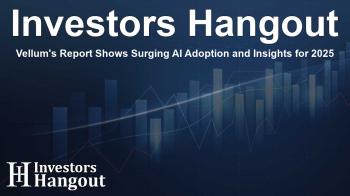Vellum's Report Shows Surging AI Adoption and Insights for 2025

Understanding the State of AI in Development
Vellum has recently released its inaugural report on the development of artificial intelligence (AI), shedding light on the current trends and challenges faced by AI developers. With insights sourced from over 1,250 developers, the report captures the dynamic nature of AI technology and its adoption within enterprises.
Key Findings on AI Adoption
The report highlights that enterprise adoption of AI is on a significant rise, with more than 25% of developers reporting at least one AI application already in production. An additional 39% are at various testing phases, underscoring a robust growth trajectory for AI solutions. This trend reflects a growing confidence among organizations in the functionality and potential of AI.
Transformational Changes in Business Operations
According to Akash Sharma, CEO of Vellum, businesses are experiencing a monumental shift in how they leverage AI technology. He emphasizes that organizations are moving past mere hype and are focused on creating applications that add real value, enhancing customer experiences and improving operational efficiency. Looking ahead to 2025, Sharma stresses the importance of developing better skills and tools to support continued AI adoption.
Pioneering Developments in AI Technology
In the competitive landscape of AI development, OpenAI has emerged as a leader, particularly with its models such as GPT-4o and GPT-4o-mini. These models have become the go-to choices for many developers, with GPT-4o being favored by 64.9% and GPT-4o-mini by 35.3%. The collaboration between Microsoft and OpenAI is also notable, presenting a strong partnership that positions them as reliable choices for enterprise technology leaders. This collaboration has effectively democratized AI access, allowing businesses of all sizes to harness advanced AI capabilities.
The Growing Practicality of AI Applications
As organizations integrate AI into their processes, more than half of developers report successfully creating practical tools like document analysis systems and customer service chatbots. These innovations demonstrate that AI is no longer a luxury but is becoming essential for efficiency and customer satisfaction. Furthermore, a noteworthy trend is the development of agentic AI, with over 55% of developers intending to innovate complex workflows by 2025.
Identifying Challenges in AI Development
Despite the promising advancements, the report indicates that challenges remain. A significant 57% of developers evaluate their AI models regularly, but a concerning 75% rely on manual evaluations. This situation signifies a missed opportunity for automation in the evaluation processes, which are vital for ensuring AI reliability and mitigating issues like hallucinations in AI outputs.
Moving Towards a Responsible AI Future
Sharma notes that while the industry is slowly recognizing the need for improved quality control, the rapid pace of innovation reveals that the sector is maturing positively. Companies are striving to balance their ambitious AI strategies with ethical considerations, paving a sustainable path for future AI adoption.
Conclusion
The findings from Vellum’s report emphasize both the progress and challenges in the AI development landscape. With substantial investment and collaboration evident in the sector, AI’s trajectory looks promising for enterprises looking to innovate and enhance their operations.
Frequently Asked Questions
What is the focus of Vellum's State of AI Development Report?
The report investigates key trends and challenges in AI development based on insights from over 1,250 developers.
How is AI adoption progressing according to the report?
More than 25% of developers reported having AI applications in production, with 39% engaged in testing.
What is Akash Sharma’s view on AI's future in business?
Sharma believes organizations must develop better expertise and tools to sustain AI adoption beyond existing applications.
Which AI models are leading in popularity?
OpenAI's GPT-4o and GPT-4o-mini are the most favored models among developers, with a significant share of usage reported.
What challenges do developers face in AI evaluation?
Many developers still rely on manual evaluations, indicating an opportunity for automation to enhance the evaluation process.
About Investors Hangout
Investors Hangout is a leading online stock forum for financial discussion and learning, offering a wide range of free tools and resources. It draws in traders of all levels, who exchange market knowledge, investigate trading tactics, and keep an eye on industry developments in real time. Featuring financial articles, stock message boards, quotes, charts, company profiles, and live news updates. Through cooperative learning and a wealth of informational resources, it helps users from novices creating their first portfolios to experts honing their techniques. Join Investors Hangout today: https://investorshangout.com/
Disclaimer: The content of this article is solely for general informational purposes only; it does not represent legal, financial, or investment advice. Investors Hangout does not offer financial advice; the author is not a licensed financial advisor. Consult a qualified advisor before making any financial or investment decisions based on this article. The author's interpretation of publicly available data presented here; as a result, they should not be taken as advice to purchase, sell, or hold any securities mentioned or any other investments. If any of the material offered here is inaccurate, please contact us for corrections.
